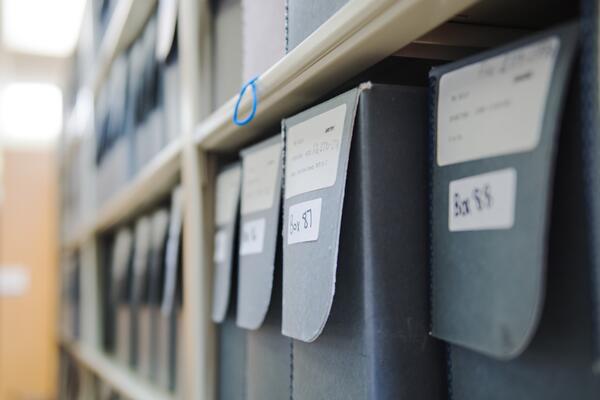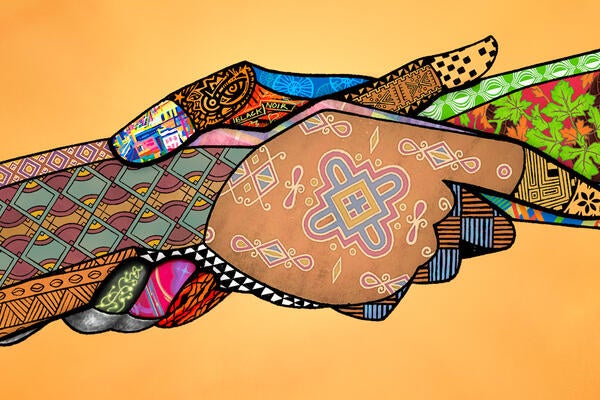
Inspire inclusion
A message from President Goel on International Women’s Day

A message from President Goel on International Women’s Day
By Vivek Goel President and Vice ChancellorInternational Women’s Day (IWD) is a celebration of the achievements of women. It is an opportunity to recognize the exceptional women faculty, students and staff at our institution. Today also serves as a reminder of the work we still need to do to accelerate equity for women in our community and society.
The theme of this year’s International Women’s Day is “inspire inclusion.” The University of Waterloo is fortunate to have many inspiring female leaders in our community. Vice-presidents, deans, directors, professors, staff, students and alumni who are leaders and mentors. Many had mentors along the way — someone who inspired them and pushed them to succeed.
I asked a few of the many inspiring female leaders at Waterloo to share the significance of mentorship within their personal and academic success.
Dr. Mary Wells, dean of the Faculty of Engineering
 “When I went through engineering, there weren't that many females, so many of my mentors were men, and they were wonderful. But I did have one very, very strong female mentor, who was my PhD supervisor, Indira Samarasekera. I was so privileged to be her PhD student.
“When I went through engineering, there weren't that many females, so many of my mentors were men, and they were wonderful. But I did have one very, very strong female mentor, who was my PhD supervisor, Indira Samarasekera. I was so privileged to be her PhD student.
She taught me so much about the importance of grace and grit in the profession, and how to utilize both aspects of it. She went on to become the president of the University of Aberta, and did so while she balanced having a very successful academic career with raising a family. She is a wonderful writer, wonderful speaker and a very deep academic, and she taught me some very important lessons about academia, professionalism and how to be professional. I can’t overstate the role that her mentorship played in my life. I feel so fortunate to continue to call her a friend today.”
Dr. Sheila Ager, dean of the Faculty of Arts
 “My first ‘boss’ when I came to Waterloo in 1987 was the chair of my department, Professor Phyllis Forsyth. Phyllis embodied all the best qualities and characteristics of a colleague and a mentor: supportive, kind, and caring, with a clear vision of our program’s mission and what we could contribute to the larger good of the faculty and the institution.
“My first ‘boss’ when I came to Waterloo in 1987 was the chair of my department, Professor Phyllis Forsyth. Phyllis embodied all the best qualities and characteristics of a colleague and a mentor: supportive, kind, and caring, with a clear vision of our program’s mission and what we could contribute to the larger good of the faculty and the institution.
Like most faculty members, it never occurred to me that I might end up in administration myself, but with Phyllis’s example, I began to see the appeal of the opportunities for personal growth and contribution to the broader University community that administrative roles can offer. I believe that her style of leadership, which focused on the creation of positive and mutually beneficial relationships, trust in a team where everyone brought different strengths to the table, and consensus building in decision making (I don’t think we ever held a vote at a department meeting) has influenced the kind of leadership that I have tried to embody.”
Dr. Lili Liu, dean of the Faculty of Health
 “My mother was my first mentor. She wasn’t educated but her wisdom is a part of my identity and guiding light. My attitude and approach to challenges are imitations of her.
“My mother was my first mentor. She wasn’t educated but her wisdom is a part of my identity and guiding light. My attitude and approach to challenges are imitations of her.
Throughout my life, I have sought or received mentorship from women and men who generously encourage and inspire me during critical turning points.”
Melissa Ireland, director of the Office of Indigenous Relations
 “One of my mentors is Dr. Carol Duncan. While completing my undergraduate degree part-time and I was working full-time as the admin of the department where she was the chair. She inspired me to continue my education and consider a master’s degree and beyond. She shared her story with me of her time working admin roles, while she pursued her post-secondary journey and shared how she balanced work, school, family and community responsibilities. She showed me how to stay in the present while visioning my future and that it was possible to grow skills in roles where some may otherwise feel like you can’t develop.”
“One of my mentors is Dr. Carol Duncan. While completing my undergraduate degree part-time and I was working full-time as the admin of the department where she was the chair. She inspired me to continue my education and consider a master’s degree and beyond. She shared her story with me of her time working admin roles, while she pursued her post-secondary journey and shared how she balanced work, school, family and community responsibilities. She showed me how to stay in the present while visioning my future and that it was possible to grow skills in roles where some may otherwise feel like you can’t develop.”
Dr. Anita Taylor, (acting) associate vice-president of the Office of Equity, Diversity, Inclusion and Anti-Racism
 “I have always been surrounded by women, who have not only acted as mentors to me, but also as inspirations, encouragers, coaches, problem-solvers, cheerleaders, and most importantly, role models. These women have included family members, friends, colleagues, and those ahead of me professionally.
“I have always been surrounded by women, who have not only acted as mentors to me, but also as inspirations, encouragers, coaches, problem-solvers, cheerleaders, and most importantly, role models. These women have included family members, friends, colleagues, and those ahead of me professionally.
I would like to highlight the importance of peer mentors. This form of mentorship cannot be overstated or overemphasized. Often, people think of mentors as those ahead of them professionally, but this is not always the case. I have been blessed and fortunate to have some strong (women) peer mentors at the University, who have given me wise counsel, encouragement, and support throughout my journey, and I attribute a lot of my success and accomplishments to them.”
Inspiring inclusion and advancing equity
Across our campuses, our community has developed programs that inspire inclusion including the mentorship collective (a mentorship program focused on supporting employees' personal and professional growth and development), inclusive washrooms, menstrual equity (a program that makes access to safe menstrual products and trusted resources easily available) and the gender equity lecture series.
All of these initiatives were in the works prior to last summer’s hate-motivated attack at Hagey Hall, but their significance is heightened in the wake of it. So many members of our community, across disciplines, have come together since the attack to bolster existing initiatives and start new ones. Important conversation have been prompted by the Antagonism and Intimidation in Academia Speaker Series and the upcoming international, interdisciplinary conference (From Targeting in Academia to Promoting Trust and Understanding) to be held at this campus in June.
At the University of Waterloo, we are a community of curious, collaborative, innovative and entrepreneurial problem-solvers and leaders who seek to understand and identify equitable and sustainable solutions for the future of humanity and our planet. In a world that places many barriers along one’s journey, I am emboldened by leaders such as those who shared their thoughts above. They have followed the lead of their mentors and are paying it forward to the next generation.
We all play a role in mentoring and empower those around us. This International Women’s Day, I encourage you to say thank you to a woman in your life who has inspired you.

Read more
Upside Robotics secures new funding to accelerate the future of sustainable farming

Read more
Discover the meticulous work that uncovered Black stories on campus and preserved them for the future

Read more
A message from the President and Vice-Chancellor
The University of Waterloo acknowledges that much of our work takes place on the traditional territory of the Neutral, Anishinaabeg, and Haudenosaunee peoples. Our main campus is situated on the Haldimand Tract, the land granted to the Six Nations that includes six miles on each side of the Grand River. Our active work toward reconciliation takes place across our campuses through research, learning, teaching, and community building, and is co-ordinated within the Office of Indigenous Relations.